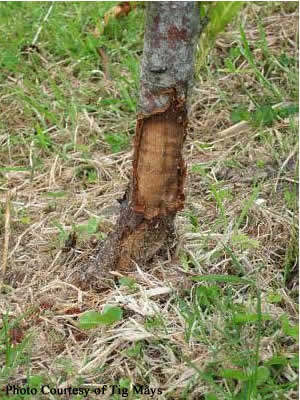 Description: Injuries incurred by lawn mowers and string trimmers can seriously threaten a tree’s health. Nicks or cuts to the base of the tree disrupt the tree’s vascular system. A tree’s vascular system can be compared to our blood vessels, which provides nourishment to every part of the body.
The vascular system is just under the bark. A thin layer of cells, called phloem, moves food manufactured in the leaves throughout the tree. This food is stored in the roots or used to make new roots and shoots. Next to the phloem is another layer of cells, called the cambium, which makes new phloem and xylem, the next layer of the tree. The xylem and phloem are responsible for moving water and nutrients from the roots to the top of the tree.
Symptoms: With the proximity of the phloem, cambium, and xylem being so close to the bark it is no wonder how important it is to prevent bark damage. If bark is removed in an entire circle around the trunk (this is called girdling), the tree can no longer move food or nutrients and will die. Although large wounds do more damage immediately, frequent small wounds, accumulating over time, cause serious problems and even death. Young trees and those with thin bark are one string trimmer encounter away from being girdled.
Wounds are serious enough by themselves, but the tree is also vulnerable to fungal organisms where openings to the bark occur. Fungi can cause inner wood rot or kill vascular tissue. Wounds can also attract insects, such as borers.
Action: To reduce the possibility of injury, remove the grass from the base of the tree and maintain a weed free mulch ring. When considering where to plant a new tree, think of mowing patterns and the width of your mower. Tight corners should be avoided.
Thank you for reviewing this information. Schneider Tree Care is committed to preserving and enhancing the quality of your property through tree care education and services. We employ professionally trained and certified arborists who are available to meet with you for a consultation at no charge.
If you have any questions or need additional information regarding the health of your trees, please contact us.
Description: Injuries incurred by lawn mowers and string trimmers can seriously threaten a tree’s health. Nicks or cuts to the base of the tree disrupt the tree’s vascular system. A tree’s vascular system can be compared to our blood vessels, which provides nourishment to every part of the body.
The vascular system is just under the bark. A thin layer of cells, called phloem, moves food manufactured in the leaves throughout the tree. This food is stored in the roots or used to make new roots and shoots. Next to the phloem is another layer of cells, called the cambium, which makes new phloem and xylem, the next layer of the tree. The xylem and phloem are responsible for moving water and nutrients from the roots to the top of the tree.
Symptoms: With the proximity of the phloem, cambium, and xylem being so close to the bark it is no wonder how important it is to prevent bark damage. If bark is removed in an entire circle around the trunk (this is called girdling), the tree can no longer move food or nutrients and will die. Although large wounds do more damage immediately, frequent small wounds, accumulating over time, cause serious problems and even death. Young trees and those with thin bark are one string trimmer encounter away from being girdled.
Wounds are serious enough by themselves, but the tree is also vulnerable to fungal organisms where openings to the bark occur. Fungi can cause inner wood rot or kill vascular tissue. Wounds can also attract insects, such as borers.
Action: To reduce the possibility of injury, remove the grass from the base of the tree and maintain a weed free mulch ring. When considering where to plant a new tree, think of mowing patterns and the width of your mower. Tight corners should be avoided.
Thank you for reviewing this information. Schneider Tree Care is committed to preserving and enhancing the quality of your property through tree care education and services. We employ professionally trained and certified arborists who are available to meet with you for a consultation at no charge.
If you have any questions or need additional information regarding the health of your trees, please contact us. 




